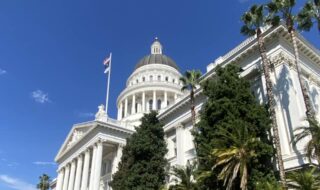August 28, 2025
Small business leaders to rally in State Capitol
Welcome to the August 25-29 edition of the Main Street Minute from your small-business-advocacy team in Sacramento.
The Legislature
Cue the countdown clock. Including today (August 25), there are 19 days left in the first half of the 2025-2026 session of the California State Legislature. Barring any calls into special session, lawmakers will adjourn September 12 and not return until more than three months later on January 5, 2026.
Members of NFIB California’s Leadership Council will fan out in the Capitol tomorrow (August 26) for a day of advocacy on some big issues remaining. Two of the higher-priority bills NFIB will be lobbying are:
— Senate Bill 690 (Caballero), which NFIB is supporting, “is necessary to stop the thousands of shakedown letters and lawsuits against California businesses of all sizes for typical business activities, like website analytics or online advertising that are already governed by the California Consumer Privacy Act (CCPA),” according to this letter of support.
— Senate Bill 512 (Perez), which NFIB is opposing, “would authorize voters in certain districts to impose transportation-related retail transactions and use taxes through initiative measures,” according to this letter of opposition, “and in so doing, “undermines the two-thirds vote requirement for special taxes.”
Of the 2,818 bills listed on the Legislature’s website, NFIB California narrowed to 59 the ones most or least helpful for small businesses. Most of the measures are now dead or have been voted to the suspense files of the Assembly and Senate.
As a reminder, Assembly and Senate suspense files are purgatories for legislation that lawmakers don’t want to deal with at the moment. In future meetings, legislators may grant a reprieve to some bills, allowing them to continue on their way to passage or defeat, or not act on other bills—effectively killing them for good. All this is done without a recorded vote. The bills above placed on suspense could come up again next year.
Want to see all 2,818 bills?
— Go to the California State Assembly website, https://www.assembly.ca.gov/. The Senate’s also goes to the same portal.
— Scroll down to the “Find Legislation” link
— Scroll down to the “Quick Bill Search” BUT DON’T TYPE ANYTHING into the fields just yet
— Hit the “Go” button
— Check out the “Bills Returned” number on top of all the listed bills.
Gut and Amend
As reported in prior Main Street Minutes, the Legislature has a few tactics at its disposal to kill bills, such as making them vanish by burying them in the murky underworld of suspense files never to be seen again, or, more transparently, not bringing them up for a vote at all.
Another tactic is ‘gut and amend,’ which rips the entrails out of one bill – which has passed the necessary committee deadlines to remain alive – and, like a skillful taxidermist, stuffs it with something completely different, which often failed to gain much support at all in a previous legislative stages.
Politico’s California Playbook reported last week on the latest use of gut and amend. “Assemblymember Gail Pellerin’s effort to allow California Supreme Court judges to extend their terms without an election will have to wait at least another year after being gutted and amended to serve as a vehicle for Newsom’s redistricting scheme.”
If the process sounds familiar, it was only a couple of years ago when another gut-and-amend was tried on an issue of huge importance to NFIB members: opening up the state’s unemployment insurance trust fund to every Tom, Dick, and Harry already with a job who decided to go out on strike.
As noted in the August 28-September 1, 2023, edition of the Main Street Minute, “’Originally about prison visitation, this measure has been gutted and amended to enable workers who have been on strike for more than two weeks to receive unemployment benefits,’ reported CalMatters. ‘Led by Democratic Sen. Anthony Portantino of Glendale and supported by the California Labor Federation, the measure was granted on Thursday a rules waiver to proceed through the Assembly.”
Reaction from business groups, including NFIB, was swift. “The business community was expecting this to happen, so it wasn’t a complete surprise,” said State Director John Kabateck in this news release picked up by media throughout state. “The most important thing everyone needs to know is the state’s unemployment insurance trust fund is fast approaching insolvency, and with it the ability to pay current unemployment benefits.”
Yes, you cynics, translated from Mumbo Jumbo into English, gut and amend means to try and pull a fast one. It’s also the reason why associations like NFIB are needed to keep an eternal vigilance on the California State Legislature.
By the Numbers
“… the state’s net liability for retiree health and dental benefits – also known as other post-employment benefits (OPEB) – increased to $91.5 billion,” according to a report released August 6 by State Controller Malia Cohen. “The liability represents the present-day cost to provide health and dental benefits to state retirees and their dependents earned as of June 30, 2024 …”
Writes CalMatters’ Dan Walters in his August 20 column, California’s finances face a perfect storm. It could eventually lead to another tax hike, “A perfect storm of economic, fiscal and political trends is battering California’s already deficit-ridden state budget, leading public employee unions and other interest groups dependent on money from Sacramento to explore hefty tax increases.
“The budget has what fiscal authorities call a ‘structural deficit,’ meaning that its revenue system, dominated by personal income taxes, cannot generate enough income to fully finance all services and programs in current law.
“Estimates of the chronic shortfall range from $10 billion a year to as much as $30 billion. Last fall, the Legislative Analyst’s Office calculated that state spending was increasing by about 6% a year while revenue was rising by only 4%.”
Speaking of By the Numbers …
Powerhouse law firm Nielsen, Merksamer, et.al., last Thursday (August 21) announced the launch of its ‘Regulatory Weekly File,’ a “ concise summary of key developments in California regulatory law, including agency actions, proposed regulations, and comment deadlines.”
In its first edition, it reported that “In the first half of 2025, state agencies officially noticed over 200 new regulations. Averaging more than one per day. The agencies that proposed the most new regulations are:
15 – Fish and Game Commission
15 – Department of Corrections and Rehabilitation
14 – Department of Food and Agriculture
10 – Department of Justice
8 – Commission on Peace Officer Standards and Training
“An honorable mention goes out to the Department of Consumer Affairs. Its many boards and bureaus collectively noticed 27 proposed rulemakings.
“Lobbying firms, trade associations, public agencies, and private entities can email administrativelaw@nmgovlaw.com to receive Nielsen Merksamer’s free Regulatory Weekly File (RWF) each week. The RWF is a comprehensive and concise update on regulatory activity across California’s state government.”
Calendar
— August 26: NFIB California’s Leadership Day at the Capitol
— August 29: Last day for fiscal committees to hear and report bills to the floor
— September 1: Labor Day. Legislature not in session
— September 9: California turns 175 years old
— September 12, 2025-January 5, 2026: Interim recess of the 2025-2026 session of the California State Legislature
— October 15: Last day for governor to sign or veto bills passed before September 12.
National
Highlights from Federal Government Relations Principal Louis Bertolotti’s weekly report
— NFIB announced the launch of new radio, digital and billboard advertisements thanking Congress for making the 20% Small Business Tax Deduction permanent. NFIB President Brad Close said, “For years, NFIB’s members have spoken out about the importance of making the 20% Small Business Tax Deduction permanent…This huge victory is the direct result of the broad support small businesses have in Washington and the tireless advocacy of small businesses all across America.”
— The 68th episode of the “Small Business Rundown” podcast was released: Tim Goodrich and Dylan Rosnick discussed the impact of labor unions on small business and the latest legislation related to unionization.
Next Main Street Minute: September 2 (We are taking Labor Day, September 1, off.) All Main Streets Minutes can be found on the NFIB website here. Pull down the California tab in the upper-right-hand corner.
NFIB is a member-driven organization advocating on behalf of small and independent businesses nationwide.
Related Articles














